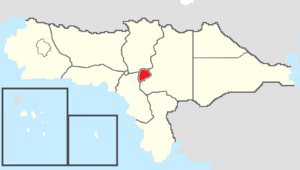Nehinaw Nation
This article is incomplete because it is pending further input from participants, or it is a work-in-progress by one author. Please comment on this article's talk page to share your input, comments and questions. Note: To contribute to this article, you may need to seek help from the author(s) of this page. |
Nehinaw Nation
Mizragi Nehinaw | |
|---|---|
Sovereign Indigenous Nation | |
| Motto(s): | |
 Map of Rizealand with the Nehinaw Nation in red | |
| Country | |
| Before admission | Weanoke River Reservation |
| Capital (and largest city) | Enkoodabooaoo |
| Joined Federation | February 6, 1976 |
| Government | |
| • President | Charlie Etchemin |
| • Deputy President | Ellis Mukki |
| • Legislature | Nehinaw Tribal Council |
| • Federal representation | Councilors
Representatives |
| Area | |
| • Total | 11,788.59 km2 (4,551.60 sq mi) |
| Population (2021) | |
| • Total | 75,336 |
| • Density | 6.39/km2 (16.6/sq mi) |
| Time zone | UTC+10 (Central) |
| Abbreviation | NN |
| ISO 3166 code | RZ-NN |
| Website | www |
The Nehinaw Nation (Nehinawish: Mizragi Nehinaw), commonly known as the Nehinaw, is a sovereign indigenous nation in central Rizealand that borders Providence to the north, Lyhoming to the east, and Fáel to the west. The Nehinaw Nation's territory has a total area of 11,788.59 square kilometers, making it the smallest sovereign indigenous nation and third smallest political division of Rizealand. The Nehinaw Nation also has a population of 75,336, making it the least populous indigenous nation and second least populous political division of Rizealand. The Nehinaw Nation's capital and largest settlement is Enkoodabooaoo.
Etymology
The Nehinaw Nation is named after the Nehinaw indigenous people that compose the Nehinaw Nation. The name "Nehinaw" is Nehinawish for "forest people" or "people of the forest."
Geography
Ecology
Climate
Conservation
Demographics
Population
Language
Religion
Health
Education
Urban Areas
Government and politics
The government of the Nehinaw Nation is established and organized according to the Nehinaw Nation Constitution. As a sovereign indigenous nation, it is treated as an autonomous self-governing entity and its relationship with the federal government of Rizealand is governed by the Wampintompac Accords and the Rizealand Articles of Federation. Of Rizealand's political divisions, sovereign indigenous nations exercise the greatest level of autonomy and sovereignty. They have the ability to form their own government as long as it is democratic, to enter into international agreements with foreign nations as long as such agreements do not violate their treaties with Rizealand, to adopt their own forms of currency or legal tender, and to place limits on trade or commerce, as long as they comply with their treaties. Sovereign indigenous nations are not allowed to operate their own military or defense force, although they may operate militias or paramilitary forces for the purposes of internal security or peacekeeping. While the Central Assembly may pass laws that are binding on sovereign indigenous nations, their representatives in the Federation Council may veto such legislation if it abridges their rights or interests, and their veto can only overridden by a super law. Like the federal government of Rizealand, the government of the Nehinaw Nation is divided into three branches of government.
The legislative branch consists of the unicameral Nehinaw Tribal Council. The Tribal Council's 15 members are elected from single-seat constituencies in two-round direct elections for three-year terms. As the legislature, the Tribal Council is responsible for enacting legislation and can do so with a simple majority although a unanimous majority is required to override the President's veto or remove government officials from office.
The executive branch is headed by the President of the Nehinaw Nation, who serves as the head of state and government. The President is elected in a nationwide two-round direct election at the same time as the Tribal Council for a three-year term. The President is responsible for signing bills into law, enforcing the laws of the nation, appointing members of his cabinet, directing government agencies, and appointing judges.
The judicial branch consists of the Court of Appeals and the Nehinaw Nation District Court. The Court of Appeals is the court of last resort with appellate jurisdiction over decisions of the District Court. The District Court has general jurisdiction to hear intergovernmental suits against the nation, criminal cases, civil cases, and cases involving juveniles, family law matters, and probate issues. Justices with the Court of Appeals and judges with the District Court are appointed for life terms by the President.
The Nehinaw Nation has a common law legal system that has Estmerish influences and also relies on indigenous customs and traditions.


